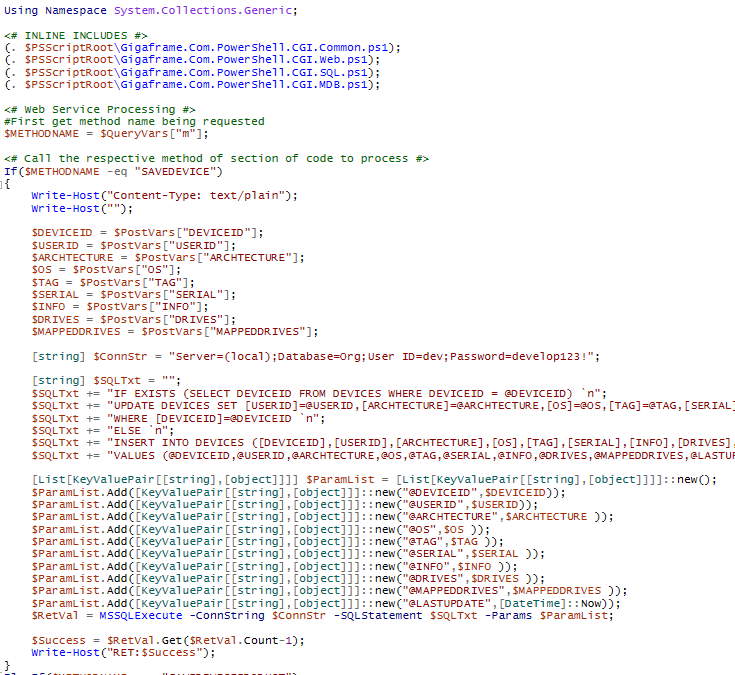Gigaframe.Com.PowerShell.CGI
How to Setup PowerShell CGI Apps with Web App Handler and Library
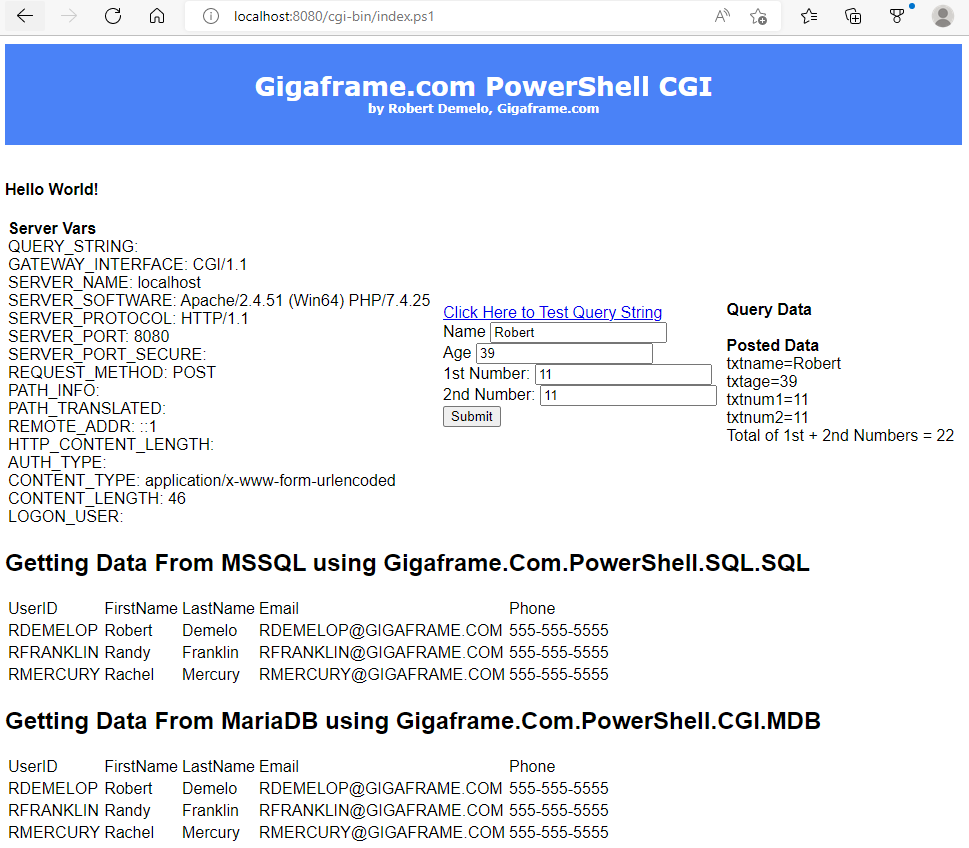
DeviceClient.ps1 - PowerShell Script on Client Send device information
|
WebService.ps1 - PowerShell Script on Server Receives device information and save to SQL
|
Table of Contents
Gigaframe.Com.PowerShell.CGI Web App Handler & Library 1
Introduction
In today’s fast paced ecosystem of numerous technology frameworks, and if you’ve resided in the technology industry long enough gradually moving from either one area to another, one project to another, or role to another, you come to realize there is an ever increasing and exuberant need for simplicity and building an efficient and effective workforce to combat the ever more demanding, complex and challenging times. For developers who move into systems management and/or systems administrative roles and/or Cybersecurity roles who need to achieve more, you quickly find that your programming, analytical and solutioning skills along with deep low-level understanding of all things technology are invaluable and highly transferable into numerous other areas by employing the many patterns known or using sheer ingenuity to develop novel solutions. For any technology person, the need for programming skills is a requirement in a variety of industries as it provides a means to deliver efficiencies and exponentially handle workloads and deliver outcomes. Programming, and its inherently associated skills, in today’s world can make one person an army.
For most in this modern ecosystem of technology, architectures, systems, their management and solution design to support necessary or evolutionary changes, Microsoft PowerShell has become an indispensable highly flexible tool for many reasons, but primarily for its broad powers combined with its simplicity. Microsoft has done a great job with PowerShell. Many developers will know that Microsoft PowerShell is an extension to an underlining Microsoft .NET framework as a scripted run on demand language, but it offers much more, especially on Windows systems. Recently with .NET Core/5+, PowerShell has become cross-platform bringing its power to Linux and other platforms.
Even though Microsoft PowerShell can do many things, such as making web requests to web services on your network or on the Internet, one thing that has been missing was the ability to develop web applications using PowerShell scripting. We hope to change that with this CGI script handler and a set of supporting web application scripted libraries and demo apps.
With a common Client and Server scripting language and framework, you don’t have employ the complexities that are inherent when incorporating a different server-side web app framework, and you don’t have to compile, and that is a throw back to other scripted server-side frameworks like ASP. Having a common client-server scripting environment helps with sustainability, such as continuity of services in life-cycle and change management and training of new staff, as Microsoft PowerShell is widely used and appears will continue to be used deep into the future, especially now that it recently shifted to cross-platform, especially moving into the Linux word.
With this CGI handler and supporting scripts, you can develop your desktop management scripts as you do now and develop simple server-side web services that can accept those web calls using the same scripting language and framework, harnessing the power of Microsoft PowerShell. You can also develop web apps that encompass the whole spectrum of modern-day web app functionality (using HTML5 and modern JavaScript libraries of course) and also generate reports from the server or any other output using Microsoft PowerShell as a web app framework, expanding on the definition of “full-stack”.
What is Old and New Again!
Potential Uses
Given this was a fun little project with limited testing, the handler and supporting scripts are intended for learning on small scale solutions on private networks. Further testing is required for it to be Internet ready, but multi-threaded load testing has been positive. Also further development can be done to employ caching approaches.
In this scope:
Learning web programming
Building a custom web UI for IT administrative processes
Building simple web services to receive computer communications
Building online reports
Building web apps
What’s Included
In the package the following is included upon unzipping:

Gigaframe.Com PowerShell CGI Script Handler Executable
psroot
Script libraries:
Gigaframe.Com.PowerShell.CGI.Common.ps1
Gigaframe.Com.PowerShell.CGI.Web.ps1
Gigaframe.Com.PowerShell.CGI.SQL.ps1
Gigaframe.Com.PowerShell.CGI.MDB.ps1
Web Apps
test.ps1
index.ps1
Web Service
webservice.ps1
ClientWebRequest with DeviceClient scripts to connect to WebService.ps1 and send data
WebLoadTester is a VS C# multi-threaded console project that can be updated to load test CGI web apps
Install PowerShell
Install Powershell by selecting “Turn Windows Features On” under “Control Panel” and “Programs and Features” and selecting Powershell option.
Installing
cross-platform
PowerShell
7.0+ based
on .NET Core:
Installing
PowerShell on Windows - PowerShell | Microsoft Learn
To
install PowerShell on Windows, use the following links to download
the install package from GitHub.
How to install on
Linux:
Install
PowerShell on Linux - PowerShell | Microsoft Learn
Install Editor (Visual Code)
Perhaps the
best code editor on the market today, at least best free editor, is
Microsoft’s Visual Code. It is also cross platform and offers
many powerful features.
Download Visual Studio Code - Mac, Linux, Windows
Install Database Server
For the demos to work fully, install MS SQL and MariaDB.
There are minimally no limits to which databases you can use with Gigaframe.Com.PowerShell.CGI as that limit is restricted by PowerShell and underlining .NET framework itself, but there are 2 script libraries that come with the software you can use to connect to MSSQL and MariaDB (MariaDB is a free variant of MySQL).
Install Microsoft SQL Server
To Install MS SQL Server (Full, Express, or Developer), go this page, download and install the engine and SQL Management Tools
SQL
Server Downloads | Microsoft
Install MariaDB
Recommend
version 10, minimally version 10.5 version, and can be found here:
MariaDB Products & Tools Downloads | MariaDB
Install the version of your choice, but Community is a free option that works.
Also download needed connector for PowerShell and .NET based applications to use:
Download MariaDB Connectors for data access & analysis | MariaDB
All Files - C connector (mariadb.com)
All Files - ODBC connector (mariadb.com)
MySQL :: Download Connector/NET
Must install "mysql-connector-net-8.0.30.msi" minimally
Ensure to install
HeidiSQL management tool.
Install Sample Database in MSSQL and MariaDB
Under the “SampesDatabase” folder you’ll find two SQL files for MSSQL and MariaDB respectively to produce the same database.
Use each in each respective database server.

Install Web App Server
There are two options for web application servers Gigaframe.Com.powerShell.CGI can be use with:
Microsoft IIS Server
Apache HTTP Server
Install Internet Information Services
On Windows you can
install IIS which is built for Windows by Microsoft and is free with
virtually all Windows versions. You need Windows Server to process
web requests for unlimited users. Other versions have limits
client-server connections but are good for development.
Install Internet Information Services (Web App Server on Windows) on Windows:
Control panel-> Select Program-> Turn Windows features on and off
And Select "Internet
Information Services" and install

Or install IIS Express:
Download Internet Information Services (IIS) 10.0 Express from Official Microsoft Download Center
Install Apache Web Server
On Windows:
Using Apache HTTP Server on Microsoft Windows - Apache HTTP Server Version 2.4
On Linux:
Download
- The Apache HTTP Server Project
Setup IIS
On IIS on Windows, add CGI and handler for “*.ps1” files to process PowerShell scripts and render web output. Set Handler Script Mapped to:
C:\gigaframecom\Gigaframe.Com.Powershell.CGI\Gigaframe.Com.PowerShell.CGI.exe %s
The CGI script
handler is explained further below but same script handler can be
used on Apache HTTP Server.
The PowerShell CGI Handler
The basis for this is a mapping is to run the PowerShell comment line as script handler:
c:\windows\system32\WindowsPowerShell\v1.0\powershell.exe -NoLogo -NoProfile -ExecutionPolicy Unrestricted -File %s
But it became quickly obvious this required something additional process CGI requests for PowerShell to handle. The CGI script handler address this gap.
The IIS script hander for “*.ps1” files mapped must be assigned to this executable:
C:\gigaframecom\Gigaframe.Com.PowerShell.CGI\Gigaframe.Com.PowerShell.CGI.exe %s

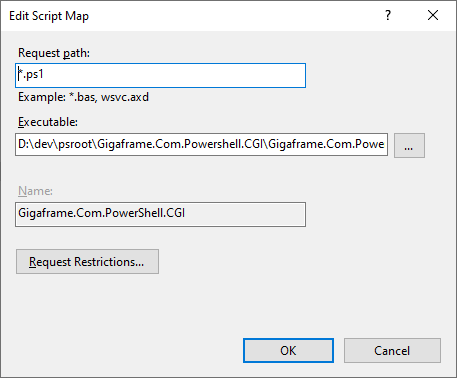
You may have to set the Feature Permission to allow Execute
This right-click the entry and select “Edit Feature Permission”, and check “Execute” and click OK.
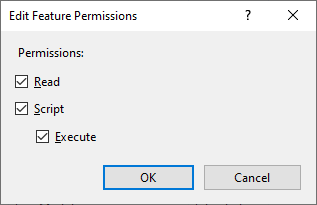
This worked but resulted in a the following error:
![]()
D:\dev\psroot\index.ps1 : File D:\dev\psroot\index.ps1 cannot be loaded. The file D:\dev\psroot\index.ps1 is not digitally signed. You cannot run this script on the current system. For more information about running scripts and setting execution policy, see about_Execution_Policies at https:/go.microsoft.com/fwlink/?LinkID=135170. At line:1 char:1 + D:\dev\psroot\index.ps1 + ~~~~~~~~~~~~~~~~~~~~~~~ + CategoryInfo : SecurityError: (:) [], PSSecurityException + FullyQualifiedErrorId : UnauthorizedAccess |
To resolve this create a local user as service account for the IIS application pool

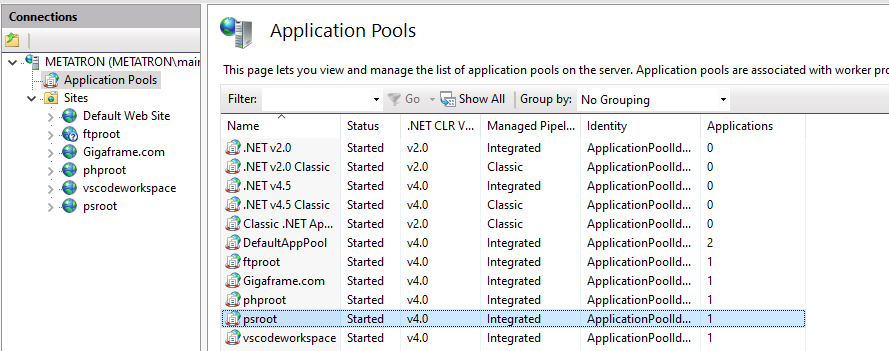
Add index.ps1 to default document:

New create a Website or Application under your main Website and assign the created app pool.
The path of the Website or Application should the path to where you placed Gigaframe.Com.PowerShell.CGI/psroot folder.
Change the application pool user to the user you created.

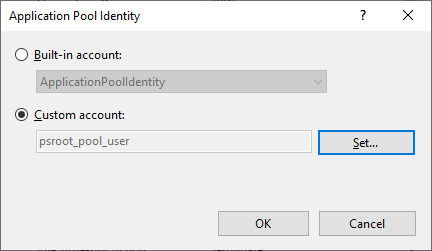
To change the execution policy for this user, logon through CMD with RUNAS.
Setting scope Current User to RemoteSigned. You can test with Unrestricted.
Restart IIS and Recycle your application pool.
>Powershell
>runas /user:”psroot_pool_user” cmd.exe
Enter the password of the user.

Setup Apache
In the installation folder or tour Apache, open “httpd.conf” configuration file under the “conf” folder.
Ensure this section in the file looks like this:
<Directory "${SRVROOT}/cgi-bin"> Options +FollowSymLinks +ExecCGI AllowOverride None Require all granted </Directory> |
Then find “AddHandler”, uncomment if needed, and add “.ps1” to the end of that line
# # AddHandler allows you to map certain file extensions to "handlers": # actions unrelated to filetype. These can be either built into the server # or added with the Action directive (see below) # # To use CGI scripts outside of ScriptAliased directories: # (You will also need to add "ExecCGI" to the "Options" directive.) # AddHandler cgi-script .cgi .ps1
They add index.ps1 to this section, which informs Apache which file to look for on a directory call: <IfModule dir_module> DirectoryIndex index.ps1 index.cgi index.html </IfModule>
|
Save the file.
Restart the Apache server, either in Windows Services, or command line.

OR cmd:
> net stop Apache2.4
> net start Apache2.4
To start Apache 2.4 web server on Linux, enter:
/etc/init.d/apache2 start
OR sudo /etc/init.d/apache2 start
OR sudo service apache2 start.
Next develop your first Powershell .ps1 script, save it into your psroot folder mapped in IIS or the cgi-bin used by Apache server.
For Apache CGI, the first line tells Apache engine where to find the executable to handle the processing of the file.
#!D:\dev\psroot\Gigaframe.Com.Powershell.CGI\Gigaframe.Com.Powershell.CGI.exe <#HEADER#> Write-Host("Content-Type: text/html"); Write-Host(""); <#HTML#> Write-Host("<html>"); Write-Host("<body>"); Write-Host("Hello World!"); Write-Host("</body>"); Write-Host("</html>");
|
Demo PowerShell Web App
This software provides a demo PowerShell web app (index.ps1) that includes some very simple yet important script libraries to inline include with your web ps1 apps. This script libraries provide a set of methods and pre-processing web code to help develop PowerShell web apps like traditional web apps using different frameworks and languages. They are located in the psroot folder.
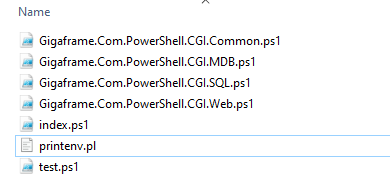
Inline script libraries included:
<# INLINE INCLUDES #> (. $PSScriptRoot\Gigaframe.Com.PowerShell.CGI.Common.ps1); (. $PSScriptRoot\Gigaframe.Com.PowerShell.CGI.Web.ps1); (. $PSScriptRoot\Gigaframe.Com.PowerShell.CGI.SQL.ps1); (. $PSScriptRoot\Gigaframe.Com.PowerShell.CGI.MDB.ps1); |
The supplied psroot folder contain an index.ps1 file with functionality used in web applications, such as Server Variables, GET and POST handling functions, and database access to MSSQL and MDB

#!D:\gigaframecom\Gigaframe.Com.Powershell.CGI\Gigaframe.Com.PowerShell.CGI.exe Using Namespace System.Collections.Generic; <#HEADER#> #Write-Host("HTTP/1.1 200 OK"); Write-Host("Content-Type: text/html"); Write-Host(""); <# INLINE INCLUDES #> (. $PSScriptRoot\Gigaframe.Com.PowerShell.CGI.Common.ps1); (. $PSScriptRoot\Gigaframe.Com.PowerShell.CGI.Web.ps1); (. $PSScriptRoot\Gigaframe.Com.PowerShell.CGI.SQL.ps1); (. $PSScriptRoot\Gigaframe.Com.PowerShell.CGI.MDB.ps1); <# BODY #> Write-Host("<html>"); Write-Host("<head>"); Write-Host("<title>Gigaframe.com Powershell CGI Demo</title>"); Write-Host("</head>"); Write-Host("<body style=""font-family:arial;"">"); Write-Host("<div style=""width:100%;height:75px;background-color:#4a82f7;color:#ffffff;text-align:center;vertical-align:middle;font-family:verdana;font-size:26px;font-weight:bold;border-color:#0f3585;padding-top:26px;"">"); Write-Host("Gigaframe.com PowerShell CGI"); Write-Host("<br/><span style=""font-size:12px;"">by Robert Demelo, Gigaframe.com</span>"); Write-Host("</div>"); Write-Host("<br/><br/>"); Write-Host("<b>Hello World!</b><br/><br/>");
Write-Host("<table style=""width:100%"">"); Write-Host("<tr>");
Write-Host("<td>"); Write-Host("<b>Server Vars</b><br/>"); Write-Host("QUERY_STRING: " + $QueryData + "<br/>"); Write-Host("GATEWAY_INTERFACE: " + [System.Environment]::GetEnvironmentVariable("GATEWAY_INTERFACE") + "<br/>"); Write-Host("SERVER_NAME: " + [System.Environment]::GetEnvironmentVariable("SERVER_NAME") + "<br/>"); Write-Host("SERVER_SOFTWARE: " + [System.Environment]::GetEnvironmentVariable("SERVER_SOFTWARE") + "<br/>"); Write-Host("SERVER_PROTOCOL: " + [System.Environment]::GetEnvironmentVariable("SERVER_PROTOCOL") + "<br/>"); Write-Host("SERVER_PORT: " + [System.Environment]::GetEnvironmentVariable("SERVER_PORT") + "<br/>"); Write-Host("SERVER_PORT_SECURE: " + [System.Environment]::GetEnvironmentVariable("SERVER_PORT_SECURE") + "<br/>"); Write-Host("REQUEST_METHOD: " + [System.Environment]::GetEnvironmentVariable("REQUEST_METHOD") + "<br/>"); Write-Host("PATH_INFO: " + [System.Environment]::GetEnvironmentVariable("PATH_INFO") + "<br/>"); Write-Host("PATH_TRANSLATED: " + [System.Environment]::GetEnvironmentVariable("PATH_TRANSLATED") + "<br/>"); Write-Host("REMOTE_ADDR: " + [System.Environment]::GetEnvironmentVariable("REMOTE_ADDR") + "<br/>"); Write-Host("HTTP_CONTENT_LENGTH: " + [System.Environment]::GetEnvironmentVariable("HTTP_CONTENT_LENGTH") + "<br/>"); Write-Host("AUTH_TYPE: " + [System.Environment]::GetEnvironmentVariable("AUTH_TYPE") + "<br/>"); Write-Host("CONTENT_TYPE: " + [System.Environment]::GetEnvironmentVariable("CONTENT_TYPE") + "<br/>"); Write-Host("CONTENT_LENGTH: " + [System.Environment]::GetEnvironmentVariable("CONTENT_LENGTH") + "<br/>"); Write-Host("LOGON_USER: " + [System.Environment]::GetEnvironmentVariable("LOGON_USER") + "<br/>"); Write-Host("</td>");
Write-Host("<td>"); Write-Host("<a href=""?param1=Robert¶m2=Developer"">Click Here to Test Query String</a>"); Write-Host("<form action=""index.ps1"" method=""post"">"); Write-Host("Name <input type=""text"" id=""txtname"" name=""txtname"" value=""$(GetPost("txtname"))""><br/>"); Write-Host("Age <input type=""text"" id=""txtage"" name=""txtage"" value=""$(GetPost("txtage"))""><br/>"); Write-Host("1st Number: <input type=""text"" id=""txtnum1"" name=""txtnum1"" value=""$(GetPost("txtnum1"))""><br/>"); Write-Host("2nd Number: <input type=""text"" id=""txtnum2"" name=""txtnum2"" value=""$(GetPost("txtnum2"))""><br/>"); Write-Host("<input type=""submit"" id=""btnSubmit"" value=""Submit"" /><br/>"); Write-Host("</form>"); Write-Host("</td>");
Write-Host("<td>"); Write-Host("<b>Query Data</b><br/>");
# Parse Query String into Array if($QueryData.Length -gt 0) { ForEach($KeyName in $QueryVars.Keys) { Write-Host("$KeyName=$($QueryVars[$KeyName]) <br/>"); } }
Write-Host("<br/>"); Write-Host("<b>Posted Data</b><br/>");
if($PostData.Length -gt 0) { ForEach($KeyName in $PostVars.Keys) { Write-Host("$KeyName=$($PostVars[$KeyName]) <br/>"); } }
$txtnum1 = GetPost("txtnum1"); $txtnum2 = GetPost("txtnum2"); If($txtnum1.Length -gt 0 -and $txtnum2.Length -gt 0) { $num1 = [Convert]::ToInt32($txtnum1); $num2 = [Convert]::ToInt32($txtnum2); Write-Host("Total of 1st + 2nd Numbers = $($num1+$num2)"); }
Write-Host("</td>");
Write-Host("</tr>"); Write-Host("</table>");
<####### MSSQL Query + Results #######>
Write-Host("<h2>Getting Data From MSSQL using Gigaframe.Com.PowerShell.SQL.SQL</h2>");
[string] $ConnStr = "Server=(local);Database=Org;User ID=dev;Password=develop123!!"; [string] $SQLTxt = "SELECT UserID, FirstName, LastName, Email, Phone FROM USERS WHERE FirstName LIKE @FirstName"; [List[KeyValuePair[[string],[object]]]] $ParamList = [List[KeyValuePair[[string],[object]]]]::new(); $ParamList.Add([KeyValuePair[[string],[object]]]::new("@FirstName","R%"));
$Ds = MSSQLQuery -ConnString $ConnStr -SQLStatement $SQLTxt -Params $ParamList;
If($_MSSQL_Error -eq $True) { Write-Host("<div>Error: $_MSSQL_Error</div>"); Write-Host("<div>ErrorMessage: $_MSSQL_ErrorMessage</div>"); }
Write-Host("<table>"); Write-Host("<tr>"); Write-Host("<td>UserID</td><td>FirstName</td><td>LastName</td><td>Email</td><td>Phone</td>"); Write-Host("</tr>"); ForEach($r in $Ds.Tables) { Write-Host("<tr>"); Write-Host("<td>$($r.UserID)</td><td>$($r.FirstName)</td><td>$($r.LastName)</td><td>$($r.Email)</td><td>$($r.Phone)</td>"); Write-Host("</tr>"); } Write-Host("</table>");
<####### MariaDB Query + Results #######>
Write-Host("<h2>Getting Data From MariaDB using Gigaframe.Com.PowerShell.CGI.MDB</h2>");
[string] $ConnStr = "Server=127.0.0.1;Database=Org;User ID=dev;Password=develop123!"; [string] $SQLTxt = "SELECT UserID, FirstName, LastName, Email, Phone FROM USERS WHERE FirstName LIKE @FirstName"; [List[KeyValuePair[[string],[object]]]] $ParamList = [List[KeyValuePair[[string],[object]]]]::new(); $ParamList.Add([KeyValuePair[[string],[object]]]::new("@FirstName","R%"));
$Ds = MDBQuery -ConnString $ConnStr -SQLStatement $SQLTxt -Params $ParamList;
If($_MDB_Error -eq $True) { Write-Host("<div>Error: $_MDB_Error</div>"); Write-Host("<div>ErrorMessage: $_MDB_ErrorMessage</div>"); }
Write-Host("<table>"); Write-Host("<tr>"); Write-Host("<td>UserID</td><td>FirstName</td><td>LastName</td><td>Email</td><td>Phone</td>"); Write-Host("</tr>"); ForEach($r in $Ds.Tables) { Write-Host("<tr>"); Write-Host("<td>$($r.UserID)</td><td>$($r.FirstName)</td><td>$($r.LastName)</td><td>$($r.Email)</td><td>$($r.Phone)</td>"); Write-Host("</tr>"); } Write-Host("</table>");
Write-Host("</body>"); Write-Host("</html>"); |
Multi-Threaded Load Testing
A load testing VS project is provided that you can customize to test.
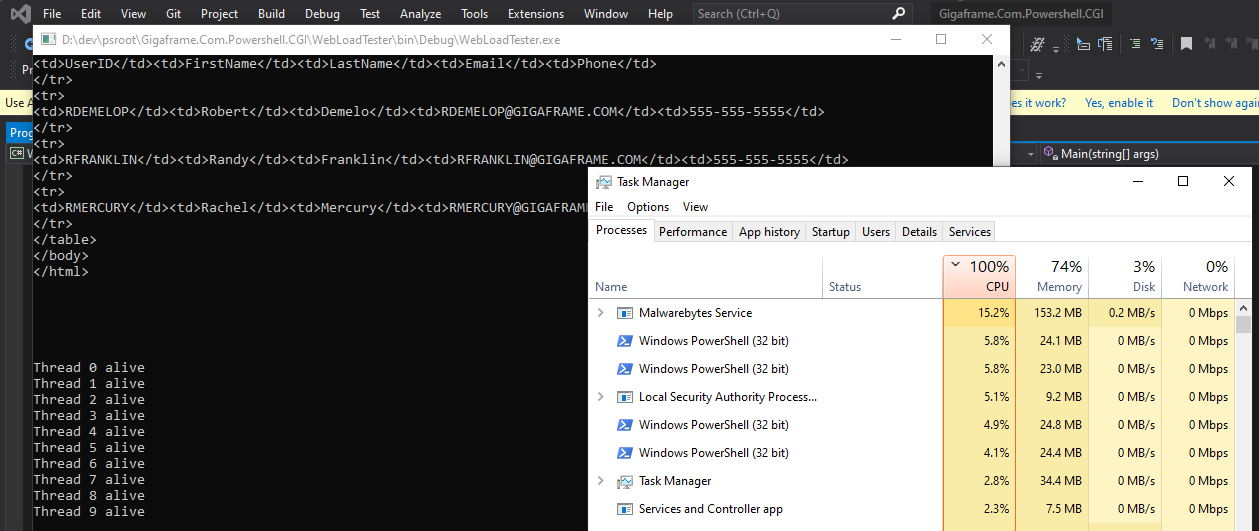
In the Demo PS1 web page script there is a section to read POSTED data and insert into MSSQL demo ORG database
<####### MSSQL Add Data #######> $SAVEPRODUCT = $PostVars["SAVEPRODUCT"]; Write-Host("<div>Save POSTED data: $SAVEPRODUCT</div>"); If($SAVEPRODUCT -eq "YES") { $DEVICEPRODUCTID = $PostVars["DEVICEPRODUCTID"]; $DEVICEID = $PostVars["DEVICEID"]; $PRODUCTVERSION = $PostVars["PRODUCTVERSION"]; [string] $ConnStr = "Server=(local);Database=Org;User ID=dev;Password=develop123!"; [string] $SQLTxt = "INSERT INTO DEVICEPRODUCTS (DEVICEPRODUCTID,DEVICEID,PRODUCTNAME,PRODUCTVERSION,LASTUPDATE) VALUES (@DEVICEPRODUCTID,@DEVICEID,@PRODUCTNAME,@PRODUCTVERSION,@LASTUPDATE)"; [List[KeyValuePair[[string],[object]]]] $ParamList = [List[KeyValuePair[[string],[object]]]]::new(); $ParamList.Add([KeyValuePair[[string],[object]]]::new("@DEVICEPRODUCTID",$DEVICEPRODUCTID)); $ParamList.Add([KeyValuePair[[string],[object]]]::new("@DEVICEID",$DEVICEID)); $ParamList.Add([KeyValuePair[[string],[object]]]::new("@PRODUCTNAME",$DEVICEPRODUCTID)); $ParamList.Add([KeyValuePair[[string],[object]]]::new("@PRODUCTVERSION",$PRODUCTVERSION )); |
Software: Gigaframe.Com.PowerShell.CGI
Copyright (C) 2022 Gigaframe.com, Robert Demelo
All rights reserved.
Read License terms, conditions and disclaimer
WARRANTY AND LIABILITY DISCLAIMER
THIS SOFTWARE AND ANY SUPPLIED AND GENERATED CODE IS
PROVIDED ``AS IS'' AND ANY EXPRESS OR IMPLIED WARRANTIES,
INCLUDING, BUT NOT LIMITED TO, THE IMPLIED WARRANTIES
OF MERCHANTABILITY AND FITNESS FOR A PARTICULAR PURPOSE
ARE DISCLAIMED. IN NO EVENT SHALL THE AUTHOR,
CONTRIBUTORS OR ANY ASSOCIATED PARTIES BE LIABLE FOR ANY
DIRECT, INDIRECT, INCIDENTAL, SPECIAL, EXEMPLARY, OR
CONSEQUENTIAL DAMAGES (INCLUDING, BUT NOT LIMITED TO,
PROCUREMENT OF SUBSTITUTE GOODS OR SERVICES; LOSS OF USE,
DATA, OR PROFITS; OR BUSINESS INTERRUPTION) HOWEVER
CAUSED AND ON ANY THEORY OF LIABILITY, WHETHER IN
CONTRACT, STRICT LIABILITY, OR TORT (INCLUDING NEGLIGENCE
OR OTHERWISE) ARISING IN ANY WAY OUT OF THE USE OF THIS
SOFTWARE, EVEN IF ADVISED OF THE POSSIBILITY OF SUCH
DAMAGE.
Contact
Do you want us to design, integrate or support a technology related solution? Fill out the form and fill me in with the details :) We love meeting new people!

